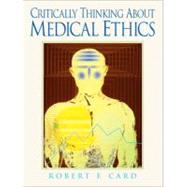
Critically Thinking about Medical Ethics : A Continuing Dialogue
- ISBN13: 9780131824843
- ISBN10: 0131824848
- Edition: 1st
- Format: Paperback
- Copyright: 2003-12-23
- Publisher: Pearson
-
Your order must be $35 or more to qualify for free economy shipping. Bulk sales, PO's, Marketplace items, eBooks and apparel do not qualify for this offer.








